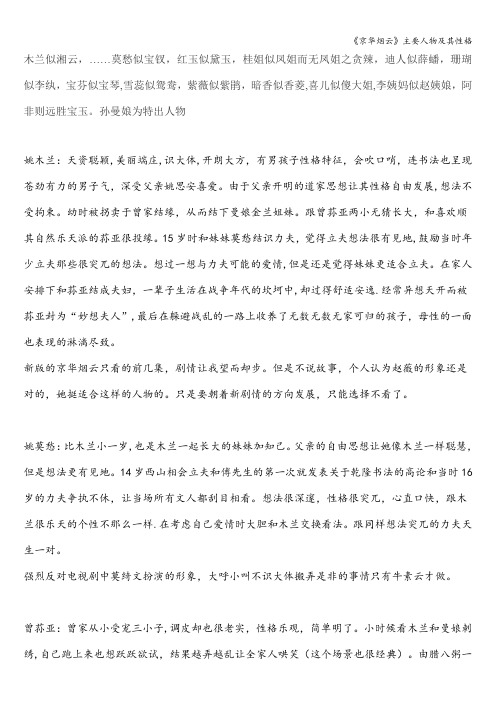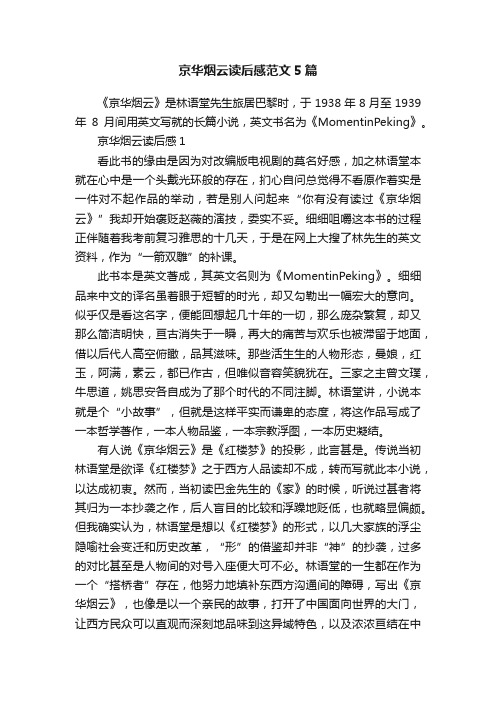京华烟云
《京华烟云》读后感优秀范文5篇

《京华烟云》读后感优秀范文5篇《京华烟云》读后感篇1《京华烟云》是著名作家林语堂先生的一本有名的书。
它描述了清朝灭亡后,民国时期北平几个典型的大户人家的生活,十分逼真的再现了那个时代的生活画卷。
它是一部由好几篇小说联成的长篇小说,但不因此而成一部分散漫无结构的故事,而反为大规模的长篇。
其中有佳话,有哲学,有历史演义,有风俗变迁,有深谈,加入剧中人物之喜怒哀乐,包括过渡时代的中国,成为现代的中国的一本伟大小说。
在这部小说里面有两个主角是十分突出的—姚木兰和姚莫愁,但最令我印象深刻的还是姚木兰。
林语堂说:“木兰,乃真女子”。
确实,在我看来姚木兰一面秉承着道家女儿的随缘自在聪明活泼,一面又有儒家媳妇的孝顺贤惠,漂亮而多才,十岁就识甲骨文,会唱戏,懂得享受生活,善烹饪,知人情,体贴,毋庸置疑她就是个是很好的情人、妻子与朋友,而在妇女受教育缺乏的当时,在尚有足够的蒙昧与保守的世界,姚木兰又是众多男士的理想。
木兰自小被曾家所救,双方父母又有交情,加上与曾荪亚青梅竹马,又和曼娘一齐居住,有曼娘为曾家谋划,她与曾荪亚的婚姻,似乎是名门大家的理所当然。
而她自己所爱的孔立夫,她虽然明明明白自己在立夫的面前,变得活泼,有不可言喻的快乐。
也明白孔立夫走了,她姚木兰的快乐也随之带走了,她会独自在校园里伤怀感叹,却不愿意与任何说这不可说的秘密,她由衷地羡慕妹妹姚莫愁,却照旧安然地过自己的日子,在礼教谨严的夫家克制地保留自己风雅的爱好,结婚之后,仍与丈夫在清晨去看荷花,收集荷花上的露珠来煮茶。
我觉得有雅趣,近人情,是姚木兰最显著的特征。
她的可爱在于她那现实中的不现实,一面顺从命运,一面又在这命运固定不变的大格局下来点小花样,浪漫地过日子,享受人生。
之后,家国大变,木兰迁住杭州,从富家生长享用一切物质的安适,后变为村妇,过幽雅山居的生活,及最后变为普通农民,成为忍苦,勇敢,伟大的民众大海中的一滴水。
父亲曾说:“若为女儿身,必做木兰也!”可见木兰是父亲的理想女子。
林语堂《京华烟云》创作背景是什么介绍

林语堂《京华烟云》创作背景是什么介绍(最新版)编制人:__________________审核人:__________________审批人:__________________编制单位:__________________编制时间:____年____月____日序言下载提示:该文档是本店铺精心编制而成的,希望大家下载后,能够帮助大家解决实际问题。
文档下载后可定制修改,请根据实际需要进行调整和使用,谢谢!并且,本店铺为大家提供各种类型的经典范文,如诗歌散文、原文赏析、读书笔记、经典名著、古典文学、网络文学、经典语录、童话故事、心得体会、其他范文等等,想了解不同范文格式和写法,敬请关注!Download tips: This document is carefully compiled by this editor.I hope that after you download it, it can help you solve practical problems. The document can be customized and modified after downloading, please adjust and use it according to actual needs, thank you!In addition, this shop provides you with various types of classic sample essays, such as poetry and prose, original text appreciation, reading notes, classic works, classical literature, online literature, classic quotations, fairy tales, experience, other sample essays, etc. if you want to know the difference Please pay attention to the format and writing of the sample essay!林语堂《京华烟云》创作背景是什么介绍【导语】:《京华烟云》是林语堂创作的一部小说,关于《京华烟云》创作背景是什么一直受到关注,来了解一下吧。
《京华烟云》主要人物及其性格

《京华烟云》主要人物及其性格京华烟云是一部由林海音所著的长篇小说,主要描写了上世纪二三十年代,民国时期上海社会的繁荣与沉沦、人情冷暖和纷争纷呈。
在小说中,涌现出许多丰满、深刻的人物形象,他们各具特色,塑造了这部小说的丰富内涵。
本文将重点介绍《京华烟云》中的主要人物及其性格。
一、李寻欢李寻欢是本书的主人公,也是一个极具个性鲜明的角色。
他生性潇洒风流,喜欢自由和独立,不喜欢受到约束和束缚。
他机智聪明,反应灵敏,善于捕捉机会,在江湖中混迹,成为一个无所不能的人物。
虽然李寻欢是一个浪子,但他内心是善良的,有着强烈的正义感,常常站出来为弱者伸张正义。
尽管他经历了许多离奇的遭遇和凄苦的爱情,但他依然乐观向上,勇敢面对挫折,表现出坚韧不拔的品质。
二、苏文茗苏文茗是李寻欢的挚友,两人头脑灵活,胆识过人,经常在江湖中并肩作战。
苏文茗性格温和稳重,为人正直善良。
他是一个重情重义的人,对朋友忠诚无比,深得李寻欢的信任。
苏文茗心思缜密,善于策划,常常发挥智慧解决问题。
他的聪明才智使他成为李寻欢的得力助手,在他们的冒险中起到了重要的作用。
三、孙小红孙小红是小说的女主角,具有争议性和复杂性的人物形象。
她是一个自由奔放、精力充沛的女人,喜欢追求刺激和自由。
她对爱情有着执着的追求,却又常常感到困惑和无奈。
孙小红聪明机智,勇敢坚定,她不愿受到传统婚姻制度的羁绊,勇敢地选择了自己的生活方式。
尽管她经历过许多艰辛和挫折,但她从不放弃对爱情的追求,最终赢得了与李寻欢的幸福。
四、王小红王小红是一个充满激情与野心的角色。
她出身寒微,但野心勃勃,渴望跻身上层社会。
她勇于追求自己的梦想,却在现实的冲击下逐渐迷失了自己。
王小红的性格复杂多变,她既有着无私的一面,也有着私心重重的一面。
她的命运在悲剧与喜剧间徘徊,最终被社会的黑暗吞噬。
五、狄云狄云是一位性格坚毅、正直勇敢的人物。
他是一个武艺高强的江湖人物,行侠仗义,正直无私。
狄云秉持着一种荣誉感和责任感,对于救助那些需要帮助的人感到义不容辞。
京华烟云翻译赏析

Being three years Tijen's senior, she was assigned to look after the boy and had done so ever since. 因为比体仁大三岁,就派她照顾体仁,一直 到现在。
Mr. Yao walked away with his heavy “tiger steps.” 姚大爷龙行虎步般走开。
京华烟云
第十一章
“My surname is Hsieh,” said Coral, “and I cannot interfere with affairs of the family.”
珊瑚说:“我姓我的谢,不能够过问您姚家 的事。”
Moreover, she was a simple, happy woman with a simple view of life, and it was unlike her to say such a thing. ……并且她为人没有什么心机,对什么事情也 能看得开,这种话真不像她嘴里说出来的。
Thank you!
He asked me why I didn't want to retire, and I said I had to wait until you returned to hear all the news and that I was not thinking of sleep.
林语堂《京华烟云》文学赏析

林语堂《京华烟云》文学赏析初次知晓《京华烟云》,约是在初中看了为央视纪念抗战胜利60周年活动之一赵薇主演的《京华烟云》,那时就被坚强而又有主见的木兰所吸引,就去图书馆买来了书阅读。
《京华烟云》是著名作家林语堂先生的一本颇有名的书。
它描写了清朝灭亡后,民国时期是北平曾、姚、牛等几个典型的大户人家的恩怨及抗日爆发后的民族情仇,非常逼真的再现了那个时代的生活画卷。
《京华烟云》是一部好几篇小说联成的长篇小说,但不因此而成一部分散漫无结构的故事,而反为大规模的长篇。
其中有佳话,有哲学,有历史演义,有风俗变迁,有深谈,有闲话,加入剧中人物之喜怒哀乐,包括过渡时代的中国,成为现代的中国的一本伟大小说。
《京华烟云》在实际上的贡献,是介绍中国社会给西洋人。
关于中国的书犹如从门外伸头探入中国社会,而描写中国的书却犹如请你进去,随你东西散步,领赏景致,叫你同中国人一起过日子,一起欢快,愤怒。
而《京华烟云》介绍中国社会,可算是非常成功,宣传力量很大。
此种宣传是间接的。
书中所包含的实事,是无人敢否认的。
此书的最大的优点不在性格描写得生动,不在风景形容得宛然如在目前,不在心理描绘的巧妙,而是在其哲学意义。
一翻开来,起初觉得如奔涛,然后觉得幽妙,流动,其次觉得悲哀,最后觉得雷雨前之暗淡风云,到收场雷声霹雳,伟大壮丽,悠然而止。
留给读者细嚼余味,忽恍然大悟;何为人生,何为梦也。
或可说,“浮生若梦”是此书之主旨。
小说给人以一场大梦的印象时,即成为伟大的小说,直可代表人生,非仅指在二十世纪初叶在北京居住的某两家的生活。
包括无涯的人生,就是伟大的小说。
《京华烟云》讲述了北平曾、姚、牛三大家族从1901年义和团运动到抗日战争三十多年间的悲欢离合和恩怨情仇,并在其中安插了袁世凯篡国、张勋复辟、直奉大战、军阀割据、五四运动、三一八惨案、“语丝派”与“现代评论派”笔战、青年“左倾”、二战爆发,全景式展现了现代中国社会风云变幻的历史风貌。
林语堂的《京华烟云》让我对中国的传统文化和古代文学产生了许多新的认识,因为这本书我开始喜欢上了道家的思想,姚思安有深厚的道家的学问,他不待见儒家思想伦理纲常的那一套,没有让木兰和莫愁裹小脚,让她们上新式的学堂,既让她们学习中国的文化,也让她们学习西方的文化。
京华烟云 介绍详情

一九三八年,旅居欧洲的林语堂突然想起翻译《红楼梦》,然而后来未能如愿,却因此写出了一曲民族的壮语悲歌——《京华烟云》。
讲述了北京曾、姚、牛三大家族三十多年的悲欢离合,将中特定年代风云变幻的历史风貌全景式的介绍给西方,填补了西方对中文化了解不足的缺陷,对于中西文化流作出了历史的贡献。
林语堂出生于一个基督教家庭,其父林至诚一心想要儿子学习英文,接受新式教育,这一出对林氏的影响甚大。
一九一七年,林语堂受业于海著名的圣约翰大学,奠定了他在英文方面的出才华。
随后,先后在美哈佛大学和德耶那大学、莱比锡大学留学,系统的接受了西方文化。
尽管林语堂是一个在西方文化熏陶下长起来的知识分子,但他同时又对中传统文化有着深刻的体会和认识,因此有人评价林氏为学贯中西的学者,此语绝非妄言。
其二,以幽默小品文扩展了现代散文写作的体式和内容。
林语堂是中第一位将英文Humour译为幽默并加以提倡的作家,他主张的“以自我为中心,以闲适为格调”(林语堂《人间世?发刊词》)的小品文大大开拓了现代散文的写作空间。
林语堂所提倡的幽默不同于讽刺,其特征是“谑而不虐”(林语堂《答青崖论幽默译名》),这是一种新的审美观,深受英文化影响。
其小品文以闲适和灵为核心,建立了一种新的散文笔调,提升了散文的艺术。
其三,以大量英文著作详细介绍中文化于西方,对改变中西方文化流的单向传播起到弥补作用。
除《京华烟云》、《风声鹤唳》、《朱门》三部曲外,林语堂在旅美期间还用英文写作了大量介绍中传统文化的著作,包括广为人知的《吾与吾民》、《生活的艺术》、《苏东坡传》等等。
促进了中西文化流。
这本书的写作背景是全民抗战的开端,虽然林语堂萌生了翻译《红楼梦》的想法,然而《红楼梦》毕竟与中特殊况下的现实不符,于是林氏“感此非其时也”,开始构思《京华烟云》的写作。
本书讲述了北平曾、姚、牛三大家族从义和团运动到抗战争三十多年间的悲欢离合和恩怨仇,并在其中安了袁世凯篡、张勋复辟、军阀混战、五四运动、三一八惨案、“语丝派”与“现代评论派”笔战、青年“左倾”、全民抗战爆发等历史事件,全景式展现了现代中社会风云变幻的历史风貌。
《京华烟云》主要人物及其性格

木兰似湘云,……莫愁似宝钗,红玉似黛玉,桂姐似凤姐而无凤姐之贪辣,迪人似薛蟠,珊瑚似李纨,宝芬似宝琴,雪蕊似鸳鸯,紫薇似紫鹃,暗香似香菱,喜儿似傻大姐,李姨妈似赵姨娘,阿非则远胜宝玉。
孙曼娘为特出人物姚木兰:天资聪颖,美丽端庄,识大体,开朗大方,有男孩子性格特征,会吹口哨,连书法也呈现苍劲有力的男子气,深受父亲姚思安喜爱。
由于父亲开明的道家思想让其性格自由发展,想法不受拘束。
幼时被拐卖于曾家结缘,从而结下曼娘金兰姐妹。
跟曾荪亚两小无猜长大,和喜欢顺其自然乐天派的荪亚很投缘。
15岁时和妹妹莫愁结识力夫,觉得立夫想法很有见地,鼓励当时年少立夫那些很突兀的想法。
想过一想与力夫可能的爱情,但是还是觉得妹妹更适合立夫。
在家人安排下和荪亚结成夫妇,一辈子生活在战争年代的坎坷中,却过得舒适安逸.经常异想天开而被荪亚封为“妙想夫人”,最后在躲避战乱的一路上收养了无数无数无家可归的孩子,母性的一面也表现的淋漓尽致。
新版的京华烟云只看的前几集,剧情让我望而却步。
但是不说故事,个人认为赵薇的形象还是对的,她挺适合这样的人物的。
只是要朝着新剧情的方向发展,只能选择不看了。
姚莫愁:比木兰小一岁,也是木兰一起长大的妹妹加知己。
父亲的自由思想让她像木兰一样聪慧,但是想法更有见地。
14岁西山相会立夫和傅先生的第一次就发表关于乾隆书法的高论和当时16岁的力夫争执不休,让当场所有文人都刮目相看。
想法很深邃,性格很突兀,心直口快,跟木兰很乐天的个性不那么一样.在考虑自己爱情时大胆和木兰交换看法。
跟同样想法突兀的力夫天生一对。
强烈反对电视剧中莫绮文扮演的形象,大呼小叫不识大体搬弄是非的事情只有牛素云才做。
曾荪亚:曾家从小受宠三小子,调皮却也很老实,性格乐观,简单明了。
小时候看木兰和曼娘刺绣,自己跑上来也想跃跃欲试,结果越弄越乱让全家人哄笑(这个场景也很经典)。
由腊八粥一事和木兰结缘,和木兰育有阿曼,阿通,阿眉两女一子。
由于战争南迁杭州,无心插柳的和当地美院女生曹丽华发展了一段婚外浪漫史,也被聪明的姚思安姚木兰父女巧妙化解,全家还和曹丽华成了很好的朋友。
《京华烟云》优秀范文初中生读后感5篇

《京华烟云》优秀范文初中生读后感5篇《京华烟云》本书大体上讲述了北平曾,姚,牛三大家族从1901年义和团运动到抗日战争30多年间的悲观离合和恩怨情仇。
这里给大家分享一些关于《京华烟云》读后感,供大家参考。
《京华烟云》读后感1我站在烟云中,好像这京华的一场梦又重演了一遍,深叹一口气,平静内心,站在那烟云外,我重新看过。
行文思路。
林语堂十分喜爱《红楼梦》,想将之翻译成英文,因为红楼与现代生活差距太大而作罢,便自己写了《京华烟云》,有人说《京华烟云》是现代版的《红楼梦》,赞誉之高我却不甚赞同。
京华确实与红楼有很多相似地方,比如家族兴衰,比如个别人物构造,但整体效果却远不如红楼的世间百态、深刻入骨,盛时未如红楼繁花锦秀,衰时虽非哗啦啦大厦倾倒,却因抗战而令有一番滋味。
京华写以姻亲关系为纽带的姚、曾、牛三大家族的兴衰,三大家族好像都是核心,又好像都不是核心,细细品味,我却觉京华是以姚木兰一人为主线,三大家族全成了辅线,姚木兰才是实实在在的主角,她的成长、观念、爱情、亲情、理想、所见、所感、作为……都详细描写,反倒让人感觉家族之感淡了不少。
红玉像极了黛玉,才华出众,体弱多病,多愁善感;莫愁像宝钗把人物喜好。
眼见书中人物百态,难免有喜恶之分。
我最喜欢的人物便是莫愁了,她拥有世俗的智慧,更踏实更沉稳,相比木兰来说,更接地气。
红玉为情所困时,她告诫红玉,像她这样心思细腻又聪明的人不要读太多书,将世事看得太清楚明白并不好,也劝她不要写诗,以她的身体状况,写诗太伤精力和心神,又易勾起她的敏感思绪;在和立夫出行时,她会至少提前一天将行李收拾好,以便最后一天不着急不忙乱。
你看,莫愁就是这样,看到她就觉得心安,她从没有过高的奢望,她把自己拥有的打理很好,她在结婚时求傅先生的字“乾坤谐好,鸾凤和鸣”,纵然陈俗老套,她却喜爱。
不知是否像书中说的,莫愁是土命,长相更圆,人也更像大地般妥帖,不过无论为什么,她这样性格的人必然是有福气的人。
《京华烟云》读后感2500字

《京华烟云》读后感2500字(最新版)编制人:__________________审核人:__________________审批人:__________________编制学校:__________________编制时间:____年____月____日序言下载提示:该文档是本店铺精心编制而成的,希望大家下载后,能够帮助大家解决实际问题。
文档下载后可定制修改,请根据实际需要进行调整和使用,谢谢!并且,本店铺为大家提供各种类型的经典范文,如读后感、读书笔记、读书心得、读书体会、美文摘抄、作文大全、其他范文等等,想了解不同范文格式和写法,敬请关注!Download tips: This document is carefully compiled by this editor.I hope that after you download it, it can help you solve practical problems. The document can be customized and modified after downloading, please adjust and use it according to actual needs, thank you!In addition, this shop provides you with various types of classic sample essays, such as reading experience, reading notes, reading experience, reading experience, beautiful essay excerpts, essays, other sample essays, etc. If you want to learn about the format and writing of different sample essays, stay tuned!《京华烟云》读后感2500字生女当如姚木兰——《京华烟云》读后感2500字:小时候看过赵雅芝版的《京华烟云》,记得那时候每天晚上早早写完作业,守在电视机旁等着潘越云的歌声响起,“最辉煌时总是最沧桑,最明亮时总是最迷惘”,当时并不是很懂其中的深意,很多的剧情到如今也已淡忘,唯有剧中姚木兰秀丽端庄、清新脱俗的美好形象在心底定格,以至于我接受不了后来任何的新版。
《京华烟云》不得不说的作者,林语堂简介

《京华烟云》不得不说的作者,林语堂简介在漳州文化中有着一个好名“鱼米花果之乡”它养育着一方名人,历史上养育着一大批教育家、政治家、思想家以及文学家等。
在现代同样也出现过较为闻名的文学家、语言学家他就是林语堂,他是贫穷的牧师家庭出生,下面我们就一起来了解一下吧。
林语堂(1895年-1976年),中国现代着名学者、文学家、语言学家和发明家。
1895年出生于福建一个基督教家庭,父亲为教会牧师。
林语堂将孔孟老庄哲学和陶渊明、李白、苏东坡、曹雪芹等人的文学作品英译推介海外。
林语堂是第一位以英文书写扬名海外的中国作家,也是集语言学家、哲学家、文学家于一身的着名学者。
林语堂于1940年、1950年和1975年三度获得诺贝尔文学奖的提名。
林语堂出生于福建龙溪(今漳州平和坂仔),婚前曾有两位恋人。
林语堂的妻子廖翠凤是他的第三位恋人。
廖翠凤是鼓浪屿的首富廖家的二小姐,而当二人拟订终身时,廖翠凤的母亲却有异议,说:“和乐(林语堂的本名)是牧师的儿子,家里很穷。
”廖翠凤却坚决果断地说:“贫穷算不了什么。
”就是这句话一锤定音,成就了林语堂与她的婚姻。
1919年1月9日林语堂与廖翠凤结婚。
结婚后,他征得廖翠凤的同意,将结婚证书烧掉了,他说“结婚证书只有离婚才用得上”。
烧掉结婚证书,表示了他们永远相爱、白头偕老的决心。
婚后不久,林语堂和廖翠凤到美国哈佛大学留学,攻读硕士学位。
在哈佛读了一年,助学金却被停了,林语堂只好前往法国打工,后来到了德国。
先在耶拿大学攻读,期间通过转学分的方式获得了哈佛大学的硕士学位,后又到莱比锡大学攻读比较语言学,1923年获得博士学位。
经济困难时,廖翠凤只得变卖首饰以维持生活。
终其一生,林语堂在操守上也是绝对纯洁的。
美色当前,欣赏一番,幽他一默,亦不讳其所好,惟不及乱耳。
先在耶拿大学攻读,1922年通过转学分的方式获得了哈佛大学的硕士学位,后又到莱比锡。
《京华烟云》读后感(精选8篇)

《京华烟云》读后感(精选8篇)《京华烟云》读后感【篇1】读完了林语堂先生的《京华烟云》,如果说是几大家族的兴衰史,不如说是反映中国一个动x时代的跌宕起伏的历史缩影,但书里更多哲学思想观和人物的人生体验变化也让我们读者的思想跳出家族纠葛史,得到无限的升华和净化。
我喜欢姚先生的道家自然大道的人生哲学,喜欢木兰聪慧美丽大彻大悟的思想转变,喜欢立夫的激进昂扬的敢作敢为,也喜欢荪亚的豁达包容快乐简单,也喜欢开始讨人厌但伟大转变的人如素云的自我救赎,更喜欢最后新一代年轻人如阿通、肖夫的舍家为国的英雄气魄。
印象最深的还是林先生最后木兰思想升华的几句话,那是魄人心声又掷地有声的铿锵有力的回响:山河不重光誓不回家乡这歌声让人热血沸腾,也看到中国人坚贞不屈的铮铮铁骨。
因为真正的`中国老百姓是扎根在中国的土壤里,在他们深爱的中国土壤里。
她也迈步加入了群众,站在群众里她的位子上。
她的内心也改变了。
她失去了空间和方向,甚至失去了自己的个体感,觉得自己是伟大的一般老百姓中的一分子了。
她父亲是全凭静坐沉思而获得,她现在也获得了,却是由于和广大的群众,男男女.女、儿童的接触。
的灾难,人的精神都能克服,能超越,由于精神的坚强弘毅,能将之改变而成为伟大荣耀,光辉万丈。
她更感觉到一个民族,其耐心,其力量,其深厚的耐心,其雄伟的力量,就如同万里长城一样,也像万里长城之经历千年万载而不朽。
在遥远的地平线上,高耸入云的天台山巍然矗立。
它在道家的神话里,是神圣的灵山,是姚老先生的精神所寄之地。
在庙门前,老方丈仍然站立。
他仍然看得见木兰、荪亚,他们的儿女,与他们同行的孩子们,所有他们的影子。
他看了一段时间,一直到他们渐渐和别人的影子混融在一处,消失在尘土飞扬下走向灵山的人群里——走向中国伟大的内地的人群里。
读到上面这些才感悟到本书的精神力量,让人动容,让人振奋鼓舞,也让人回味无穷,中国是伟大的民族,就如青青原上草,生生不息,长歌万里,我们只有不忘x心,发奋图强,才是为家为国的好男人!《京华烟云》读后感【篇2】意犹未尽,这是我读完《京华烟云》后的第一感觉。
关于《京华烟云》的读后感

关于《京华烟云》的读后感《京华烟云》主要描述了姚家、曾家、牛家三大家族中从1901年义和团运动到抗日战争三十多年间的悲欢离合和恩恩怨怨,今天小编在这分享一些关于《京华烟云》的读后感给大家,欢迎大家阅读!京华烟云读后感(一):《京华烟云》是著名作家林语堂先生的一本有名的书。
它描述了清朝灭亡后,民国时期北平几个典型的大户人家的生活,十分逼真的再现了那个时代的生活画卷。
它是一部由好几篇小说联成的长篇小说,但不因此而成一部分散漫无结构的故事,而反为大规模的长篇。
其中有佳话,有哲学,有历史演义,有风俗变迁,有深谈,加入剧中人物之喜怒哀乐,包括过渡时代的中国,成为现代的中国的一本伟大小说。
在这部小说里面有两个主角是十分突出的—姚木兰和姚莫愁,但最令我印象深刻的还是姚木兰。
林语堂说:“木兰,乃真女子”。
确实,在我看来姚木兰一面秉承着道家女儿的随缘自在聪明活泼,一面又有儒家媳妇的孝顺贤惠,漂亮而多才,十岁就识甲骨文,会唱戏,懂得享受生活,善烹饪,知人情,体贴,毋庸置疑她就是个是很好的情人、妻子与朋友,而在妇女受教育缺乏的当时,在尚有足够的蒙昧与保守的世界,姚木兰又是众多男士的理想。
木兰自小被曾家所救,双方父母又有交情,加上与曾荪亚青梅竹马,又和曼娘一齐居住,有曼娘为曾家谋划,她与曾荪亚的婚姻,似乎是名门大家的理所当然。
而她自己所爱的孔立夫,她虽然明明明白自己在立夫的面前,变得活泼,有不可言喻的快乐。
也明白孔立夫走了,她姚木兰的快乐也随之带走了,她会独自在校园里伤怀感叹,却不愿意与任何说这不可说的秘密,她由衷地羡慕妹妹姚莫愁,却照旧安然地过自己的日子,在礼教谨严的夫家克制地保留自己风雅的爱好,结婚之后,仍与丈夫在清晨去看荷花,收集荷花上的露珠来煮茶。
我觉得有雅趣,近人情,是姚木兰最显著的特征。
她的可爱在于她那现实中的不现实,一面顺从命运,一面又在这命运固定不变的大格局下来点小花样,浪漫地过日子,享受人生。
之后,家国大变,木兰迁住杭州,从富家生长享用一切物质的安适,后变为村妇,过幽雅山居的生活,及最后变为普通农民,成为忍苦,勇敢,伟大的民众大海中的一滴水。
京华烟云读后感范文5篇

京华烟云读后感范文5篇《京华烟云》是林语堂先生旅居巴黎时,于1938年8月至1939年8月间用英文写就的长篇小说,英文书名为《MomentinPeking》。
京华烟云读后感1看此书的缘由是因为对改编版电视剧的莫名好感,加之林语堂本就在心中是一个头戴光环般的存在,扪心自问总觉得不看原作着实是一件对不起作品的举动,若是别人问起来“你有没有读过《京华烟云》”我却开始褒贬赵薇的演技,委实不妥。
细细咀嚼这本书的过程正伴随着我考前复习雅思的十几天,于是在网上大搜了林先生的英文资料,作为“一箭双雕”的补课。
此书本是英文著成,其英文名则为《MomentinPeking》。
细细品来中文的译名虽着眼于短暂的时光,却又勾勒出一幅宏大的意向。
似乎仅是看这名字,便能回想起几十年的一切,那么庞杂繁复,却又那么简洁明快,亘古消失于一瞬,再大的痛苦与欢乐也被滞留于地面,借以后代人高空俯瞰,品其滋味。
那些活生生的人物形态,曼娘,红玉,阿满,素云,都已作古,但唯似音容笑貌犹在。
三家之主曾文璞,牛思道,姚思安各自成为了那个时代的不同注脚。
林语堂讲,小说本就是个“小故事”,但就是这样平实而谦卑的态度,将这作品写成了一本哲学著作,一本人物品鉴,一本宗教浮图,一本历史凝结。
有人说《京华烟云》是《红楼梦》的投影,此言甚是。
传说当初林语堂是欲译《红楼梦》之于西方人品读却不成,转而写就此本小说,以达成初衷。
然而,当初读巴金先生的《家》的时候,听说过甚者将其归为一本抄袭之作,后人盲目的比较和浮躁地贬低,也就略显偏颇。
但我确实认为,林语堂是想以《红楼梦》的形式,以几大家族的浮尘隐喻社会变迁和历史改革,“形”的借鉴却并非“神”的抄袭,过多的对比甚至是人物间的对号入座便大可不必。
林语堂的一生都在作为一个“搭桥者”存在,他努力地填补东西方沟通间的障碍,写出《京华烟云》,也像是以一个亲民的故事,打开了中国面向世界的大门,让西方民众可以直观而深刻地品味到这异域特色,以及浓浓亘结在中华民族几千年历史中的社会形态,风土人情。
京华烟云第一章赏析

原文: She had small feet and exquisite jet-black
hair done in a loose coiffure, and wore an old broad sleeved pink jacket,trimmed around the collar and the sleeve ends with a three-inch broad, very pale green satin.(P5)
写作背景
《京华烟云》是林语堂旅居巴黎时于1938年8月至1939年8月 间用英文写就的长篇小说,并题献给“英勇的中国士兵”,
英文书名为《Moment in Peking》,《京华烟云》是他转译
为中文后的书名,也有译本将这本书译为《瞬息京华》。林 语堂原本打算将《红楼梦》译作英文介绍给西方读者,因故 未能译成,此后决定仿照《红楼梦》的结构写一部长篇小说, 于是写出了《京华烟云》。
原文: You could see at a glance that the mother was
ruler of the family. She was a woman in the middle thirties, broad-shouldered, square-faced, and inclined to be stout; and she spoke in a clear, commanding voice.(P6)
译文:一双金莲儿,纤纤盈握,乌油油的发髻,松松的 挽着,身穿一件桃红的短褂子,宽大的袖子,镶着三寸 宽绿缎子的滚边儿。 评析:“small feet”如果直译为“小脚”译文的美感就大打 折扣,但译为“金莲”就能让读者从语言中感受到一种美, 而且又加上“纤纤盈握”一词,尤为形象,突出中国那一 特定历史时期女子以“小脚”为美的特点;同样,“乌油油 的发髻”,也是中国古代女子美丽的标志,比“乌黑的头 发”更形象。
2023届高考专题复习:小说专题训练--林语堂《京华烟云》(含答案)

小说专题训练-----林语堂《京华烟云》一、阅读下面的文字,完成下列小题。
京华烟云(节选)林语堂战争开始之时,木兰正和全家在牯岭避暑。
阿通已经大学毕业,正在上海附近政府电信局的无线电台做事。
他请了六个礼拜的假,随家到牯岭。
时局越来越紧张,中国将来的命运如何?或沦为日本的保护国,陷于万劫不复之地;或抗战建国,使中国成为一个自由团结独立的国家。
在七月十七号,政府终于向全国广播抗战到底的国策。
阿通说:“我愿去前线。
”木兰喊道:“什么?”她的脸突然沉下来。
“妈,怎么?您不恨日本吗?”木兰看着荪亚,默不作声,荪亚也一言不发。
阿通又问:“您不赞成?现在国家需要人人奋斗啊。
”但是木兰却走开了,依然没说话。
又经过一个钟头,她也一句话没说。
她失去了心情的平静。
她突然的感觉,就犹如战争来临时普天下的父母的感觉一样。
战争已经来到门前,为什么过去她没想到呢?中国现在向她来有所索取,索取她的儿子。
她和丈夫商量这件事。
一个钟头之后,她和荪亚把阿通叫去,有话和他说。
她问:“你已经决定去打仗了吗?”阿通回答说:“我若不去,我受教育有什么用?妈,我不了解您的意思。
”“你不能了解……我只是问你是不是已经决定。
”阿通说:“是,我已经决定。
”木兰心里在挣扎交战,她眼中流出泪来。
她说:“阿通,我就只有你这么一个儿子……”说着哭起来。
荪亚说:“儿子,你现在年轻,你不懂父母的心……”木兰喊道:“我宁愿自己死,不愿看见你死。
我受不了。
”他父亲又说:“阿通,你听着。
你妈和我已经商量过。
国家若需要你,你必须要去,可是你要知道,在我和你妈这方面忍受的牺牲比你的牺牲要大。
我们并不是阻拦你。
你也要为家里想一想。
”阿通说:“国若亡了,家还有什么用?”阿通两手很紧张地攥住椅子的两臂,他说:“爸爸,妈,我知道您两位老人家难过……可是我不得不去。
”木兰脸上流着眼泪,抬头看了看儿子,她说:“好,去吧!”中国大批援军进入吴淞地区,在上海附近长江三角洲上将要进行大规模的阵地战。
京华烟云的写作背景是什么

京华烟云的写作背景是什么《京华烟云》写作背景《京华烟云》前面的献词为:全书写罢泪涔涔,献予歼倭抗日人。
不是英雄流热血,神州谁是自由民。
林语堂写《京华烟云》时,正值二战爆发,日本发动全面侵华战争,中华各族儿女奋力抗战之际。
林语堂深深的热爱着伟大的祖国,天下兴亡,匹夫有责,他认为作为一个与时俱进的中国知识分子,在国家形势危急的情况下,就应该义不容辞的将自己的安危和国家的安危紧紧地捆绑在一块,就应该责无旁贷的把自己投入到挽救国家的阵营中去。
他认为“作为一个作家,最有效的武器是作品”,他认为“要使读者如历其境,如见其人,必须借助小说这种手段来表达”,这也是林语堂为什么要写这本书的原因。
《京华烟云》内容简介《京华烟云》以主人公姚木兰的命运发展为线索,讲述了北平曾、姚、牛三大家族从1901年义和团运动到抗日战争30多年间的悲欢离合恩怨情仇,并在其中安插了袁世凯篡国、张勋复辟、直奉大战、军阀割据、“五四”运动、“三一八”、“雨丝派”与“现代评论派”笔战、青年左倾、二战爆发等历史事件,全景式展现了中国近现代社会风云变动的历史风貌。
书中穿插的是近现代中国的发展史,那是一个多事之秋,一个的时代,一个战争的年代,当时的岌岌可危,社会上不安,中国面临着改朝换代的变化,但是,书中从无绝望的笔迹,反而到处都彰示着积极的希望,照射出胜利的光辉。
尤其是在书中结尾处,人们喊着:“山河不重光,誓不回家乡”的口号,一个民族,由于一个共同的爱国热情而结合,由于逃离一个共同的敌人而跋涉万里。
一个民族其雄伟的力量,像万里长城之经历千年万载而不朽。
亿万的中国人共同在这伟大的史诗时代奋斗生活着。
这就是中国的希望所在。
《京华烟云》作者简介林语堂,福建龙溪人,1895年出生于福建一个基督教家庭,父亲为教会牧师。
1912年林语堂入上海圣约翰大学,毕业后在清华大学任教。
1919年秋赴美哈佛大学文学系。
1922年获文学硕士学位。
同年转赴德国入莱比锡大学,专攻语言学。
- 1、下载文档前请自行甄别文档内容的完整性,平台不提供额外的编辑、内容补充、找答案等附加服务。
- 2、"仅部分预览"的文档,不可在线预览部分如存在完整性等问题,可反馈申请退款(可完整预览的文档不适用该条件!)。
- 3、如文档侵犯您的权益,请联系客服反馈,我们会尽快为您处理(人工客服工作时间:9:00-18:30)。
京华烟云Moment in Peking ——Written by 林语堂, Translated by 张振玉范例欣赏:Moment in Peking(1)——Mannia’s Wedding DayLin YutangThe next day, May the twenty-fifth, was Mannia’s wedding day. While her mother was getting things ready with the assistance of Coral and Mulan, and they were waiting for the sedan chairs to come at the proper hour, the Tseng house was in a great turmoil. There were a thousand things to prepare for the bride, and red sashes and colored festoons of silk and big lanterns to be hung up, and the bridegroom’s rooms to be decorated. Everything had to be new, tables, candle stands, wash basins, spittoons, commodes, even the curtains and bedding on Pingya’s bed—practically everything except the bed itself on which he was sleeping. The leeks and mint herbs hung above the door by every family on the Dragon-Boat Festival at the onset of summer, had to be taken down, and red festoons hung in their place above the door and along the door jambs. A disinfection, to drive away evil air, was usually done by burning mint herbs in the house on the Dragon-Boat Festival and children carried beautiful colored silk pendants on their breasts, containing fragrant powder from herbs to ward off disease for the summer, which was the usual season for epidemics. In this way Pingya’s room had been fumigated before he was moved in. T he idea now however, was to make as great a change of atmosphere in the sickroom as possible, showing every where the red color of happiness to drive away any lurking evil air.On top of all these preparations, Pingya had taken a turn for the worse. He complained that he could not see clearly, and his bowels would not function. His tongue showed a thick coating, and his limbs were cold while he felt hot inside. His pulse was weak and sluggish. The doctor had to press all three fingers on his wrist to feel the pulse beat, and this was a sign the volume of blood was decreasing. Upon the varied nuances of the pulse beats and their undertones, the yun, the old doctor relied as the modern doctor relies upon the temperature chart; but it was something finely felt, to be recognized only by experience and impossible to state in figures. Although Pingya’s mind was clear, he was too weak to talk, and all morning and afternoon, he lay half-dormant, vaguely conscious that this was his wedding day.(Lin Yutang. Moment in Peking . Beijing: ForeignLanguage Teaching and Research Press, 2005 P117-118)【参考译文】京华烟云(1)——曼娘出嫁的日子林语堂第二天,五月二十五日,是曼娘出嫁的日子。
他母亲请珊瑚、木兰帮着整理东西,也正等着花轿准时到来的时候儿,曾家则忙得一团乱,千百件为新娘的事在等着办,红带子,丝绸彩饰,红灯笼都要悬挂,新郎的屋子要装饰。
一切都要焕然一新。
桌子,蜡签儿,脸盆,痰盂,平亚床上的帐幔,被褥,除去他还躺在上面的床,可以说件件要换新。
五月节大门上换的艾蒲也要拿下来,在原地方儿与门框上要挂上红彩绸。
在五月节,都按老规矩在房里点艾草驱邪避虫,孩子们在胸前要带五彩丝绸的小包,叫“方胜儿”,里面装着香料以防夏天的疾病。
所以平亚搬进他的新屋子之前,也得要用烟熏,现在尤其是为了使病房气象一新,处处都是喜气洋洋的红颜色,要驱除一切不祥之气。
纵然大家准备这些事忙得不可开交,平亚的病却日渐严重。
他说眼睛看不清楚,大便不同,舌苔很厚,内部发热,四肢发冷。
脉搏微弱而迟滞。
一是必须把三个手指头按在手腕子上才摸得到脉跳,这是血亏的征兆。
有经验的老中医之看脉搏的“韵”,也可以辨别出脉跳动下细微的差别,正如西医之看体温表;不过手指头的感觉很细微,可意会而不可言传。
平亚一上午一下午,始终躺在床上,是半睡状态,对今天是他的花烛大喜之日,只是影影绰绰地感觉到而已。
(林语堂著.张振玉译.京华烟云.西安:陕西师范大学出版社,2005)【作者简介】林语堂(1895——1976)福建龙溪人。
原名和乐,后改玉堂,又改语堂。
1912年入上海圣约翰大学,毕业后在清华大学任教。
1919年秋赴美哈佛大学文学系。
1922年获文学硕士学位。
同年转赴德国入莱比锡大学,专攻语言学。
1923年获博士学位后回国,任北京大学教授、北京女子师范大学教务长和英文系主任。
1924年后为《语丝》主要撰稿人之一。
1926年到厦门大学任文学院长。
1927年任外交部秘书。
1932年主编《论语》半月刊。
1934年创办《人间世》,1935年创办《宇宙风》,提倡“以自我为中心,以闲适为格凋”的小品文。
1935年后,在美国用英文写《吾国与吾民》、《京华烟云》、《风声鹤唳》等文化著作和长篇小说。
《京华烟云》享现代版《红楼梦》之美誉,四度获诺贝尔文学奖提名之殊荣,是文学大师林语堂最负盛名的传世之作。
1944年曾一度回国到重庆讲学。
1945年赴新加坡筹建南洋大学,任校长。
1952年在美国与人创办《天风》杂志。
1966年定居台湾。
1967年受聘为香港中文大学研究教授。
1975 年被推举为国际笔会副会长。
1976年在香港逝世。
【译者简介】张振玉,著名学者和翻译家,翻译出版了林语堂的《京华烟云》(1941年在上海出版)、《红牡丹》、《武则天正传》、《苏东坡传》、《八十自叙》等。
在《京华烟云》中译者附加各章前之回目,皆排印于正文之前,以便读者查考。
国内外翻译界一致认为张振玉翻译的《京华烟云》是目前诸多译本中译笔最好的一种。
Moment in Peking (2)——Yao Mulan’s PekingLin YutangBut Mulan was a child of Peking. She had grown up there and had drunk in all the richness of life of the city which enveloped its inhabitants like a great mother soft toward all her children’s requests, fulfilling all their whims and desires, or like a huge thousand-year-old tree in which the insects making their home in one branch did not know what the insects in the other branch were doing. She had learned from Peking its tolerance, geniality, and urbanity, as we all in our formative years catch something of the city and country we live in. She had grown up with the yellow-roofed palaces and the purple and greenroofed temples, the broad boulevards and the long, crooked alleys, the busy thoroughfares and the quiet districts that were almost rural in their effect; the common man’s homes with their inevitable pomegranate trees and jars of goldfish, no less than the rich man’s mansions and gardens; the open-air tea houses where men loll on rattan armchairs under cypress tress, spending twenty cents for a whole afternoon in summer; the enclosed teashops where in winter men eat steaming-hot mutton fried with onion and drink pehkan and where the great rub shoulders with the humble; the wonderful theaters, the beautiful restaurants, the bazaars, the lantern streets and the curio streets; the temple fairs which register the days of the month; the system of poor man’s shop credits and poor man’s pleasures, the openair jugglers, magicians, and acrobats of Shihshahai and the cheap operas of Tienchiao; the beauty and variety of the pedlars’ street-cries, the tuning forks of itinerant barbers, the drums of second-hand goods dealers working from house to house, the brass bowls of the sellers of iced dark plum drinks, each and every one clanging in the most perfect rhythm; thepomp of wedding and funeral processions half-a-mile long and official sedan chairs and retinues; the Manchu women contrasting with the Chinese camel caravans from the Mongolian desert and the Lama priests and Buddhist monks; the public entertainers, sword swallwoers and beggars, each pursuing his profession with freedom and an unwritten code of honor sanctioned by century-old custom; the rich humanity of beggars and “beggar kings,” thieves and thieves’ protectors, mandarins and retired scholars, saints and prostitutes, chaste sing-song artists and profligate widows, monks’ kept mistresses and eunuchs’ sons, amateur singers and “opera maniacs”; and the hearty and humorous common people.(Lin Yutang. Moment in Peking . Beijing: ForeignLanguage Teaching and Research Press, 2005 P143-144)【参考译文】京华烟云(2)——姚木兰眼中的北京城林语堂但是木兰是在北京长大的,陶醉在北京城内丰富的生活里,那种丰富的生活,对当地的居民就犹如伟大的慈母,对儿女的请求,温和而仁厚,对儿女的愿望,无不有求必应,对儿女的任性,无不宽容包涵,又像一棵千年老树,虫子在各枝丫上做巢居住,各自安居,对于其它各枝丫上居民的生活情况,茫然无所知。
